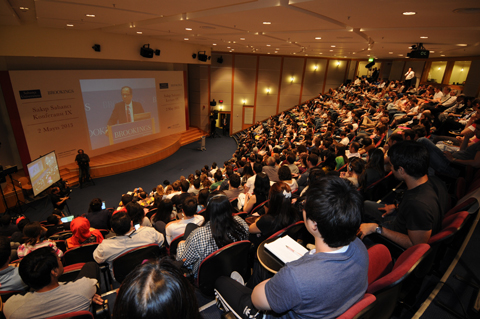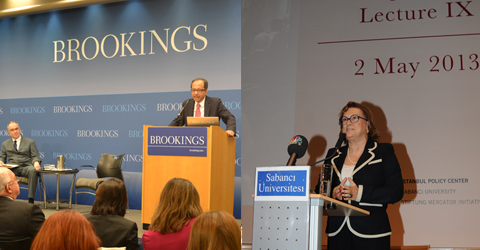07/05/2013
Ninth Sakıp Sabancı Lecture Held in Washington DC
World Bank Chief Economist Dr. Kaushik Basu: “I believe the crisis will continue for two more years.”

Sabancı University Board of Trustees Chair Güler Sabancı: “Economic growth that is not based on human and ethical values cannot succeed.”
The ninth “Sakıp Sabancı Lecture” was held by Sabancı University in partnership with Brookings Institution.
Held annually in memory of the late Sakıp Sabancı, the Honorary Chairman of Sabancı University, this year’s lecture was given by Dr. Kaushik Basu, senior vice president and chief economist of the World Bank. Dr. Basu’s address was titled “Emerging Nations and the Evolving Global Economy.”

On May 2, Sabancı University and the Brookings Institution hosted Dr. Kaushik Basu, senior vice president and chief economist of the World Bank, for the ninth annual Sakıp Sabancı Lecture.
Making introductory remarks from the Sabancı University campus in Istanbul, Board of Trustees Chair Güler Sabancı said she was proud that the partnership between Brookings Institution and Sabancı University was in its ninth year, continuing, “This lecture is given in remembrance of my uncle Sakıp Sabancı and his achievements throughout his life. This lecture honors his legacy and connects Istanbul with Washington through Brookings Institution and Sabancı University. This is something my uncle would have loved to hear and see. And I believe that he feels this.”

Güler Sabancı went on, “My uncle was aware that no initiative would succeed, no market would be free and no growth could be sustained without ethics, values and a true loyalty to the benefit of our neighbors, our environment and our society. As the Sabancı family, these values are ingrained in our hearts.”

Addressing the Sabancı University students attending the lecture, Güler Sabancı said, “I am thrilled to be in Istanbul today, attending this lecture with you. I am sure that the Sakıp Sabancı would have been, too.”
In praise of Dr. Kaushik Basu, senior vice president and chief economist of the World Bank, Sabancı said, “Dr. Kaushik Basu has championed these values and dedicated his work to the welfare of the peoples of the world.”

In his lecture titled “Emerging Nations and the Evolving Global Economy,” Dr. Kaushik Basu said that the times were risky in the shadow of growing globalization, continuing, “The current situation and the changing structure of the world is part of nature. However, the last 50 years have seen the most rapid change experienced by the social world.” Basu argued that while discussions on whether economic globalization is good or bad continue, they have become irrelevant because globalism exists and is expanding.
Referring to the rapidly developing economies of BRICS countries, Basu said that such growth was only very rare, and continued, “Turkey is another country that I have been following closely. There is an innovative environment particularly in macroeconomic policymaking.”
Explaining that the economic crisis, with its impact reaching far beyond Europe, was far from ending, Dr. Kaushik Basu said, “I believe the crisis will continue for two more years. Liquidity injections around the world buy some time but do not solve problems. Some injections in 2011 and 2012 were of too high a dosage. They will have to be repaid when the time comes.”
Kaushik Basu: “Austerity policies are a requirement in countries with too high debt ratios. However these should be implemented in a way that will not disrupt income distribution.”

Dr. Kaushik Basu said that the protracted economic regression was particularly devastating on emerging countries, adding, “Even if they grow slowly, industrialized countries are rich countries. The real problem lies in emerging nations. They may be growing rapidly, but are growing within a poor society.”
Basu explained that the growth of economies did not necessarily bring about growth in the markets: “The workforce issue will continue to deteriorate. Wages as a percentage of the global GDP are shrinking. Income becomes a smaller part of the global GDP. The share of the workforce is diminishing.”
Dr. Kaushik Basu called for a more extensive international economic cooperation in order to resolve the problems arising in times of economic regression, saying “Central banks should come together and implement a coordinated economic approach.”
Basu said that while it was political strife that prevented the formation of a greater economic cooperation scheme, the current economic crisis was a challenge great enough to overpower political strife. Dr. Kaushik Basu concluded, “I now believe that politics can now be left behind because economic difficulties continue to mount.”
The moderators of the lecture were Kemal Kirişci, TÜSIAD Senior Fellow and Director of the Brookings Turkey Project at Brookings and Sabancı University Professor İzak Atiyas in Istanbul. Sabancı University students asked questions to Dr. Basu about the lecture.

Sakıp Sabancı Lectures
Named in honor of the late Sakıp Sabancı, the Honorary Chairman of the Sabancı University Board of Trustees, the Sakıp Sabancı Lecture is held annually by Sabancı University in association with the Brookings Institution to discuss the latest developments in global politics and to draw attention to the role of Turkey in political developments on an international level.
Keynote speakers of previous conferences were Former US Secretary of State Madeleine Albright, Former World Bank President Paul Wolfowitz, Former US Assistant Secretary of State Richard Holbrooke, Former US Assistant Secretary of State and Ambassador Nicholas Burns, Chancellor Oxford University Chris Patten, US Assistant Secretary of State for Europe and Eurasian Affairs Philip Gordon, former Secretary General of NATO and European Union's High Representative for Common Foreign and Security Policy Javier Solana and former US National Security Advisor Zbigniew Brzezinski.
About Dr. Kaushik Basu
Kaushik Basu is senior vice president (Development Economics) and chief economist of the World Bank. He was until recently the chief economic adviser to the Government of India. Basu’s contributions to economics span development economics, welfare economics, industrial organization and game theory. He has published widely, including 160 papers in refereed journals and scholarly volumes; numerous articles for magazines and newspapers; and several books, including Beyond the Invisible Hand: Groundwork for a New Economics (Princeton University Press and Penguin, 2010).





